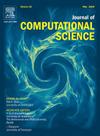参数不确定性量化的随机deep-Ritz
IF 3.7
3区 计算机科学
Q2 COMPUTER SCIENCE, INTERDISCIPLINARY APPLICATIONS
引用次数: 0
摘要
科学机器学习已成为材料科学与工程中越来越重要的工具。它特别适合处理涉及许多变量的材料问题,或者允许快速构建材料模型的替代品,仅举几例。从数学上讲,材料科学和工程中的许多问题都可以归结为变分问题。然而,在变分公式的背景下处理材料中存在的不确定性仍然是科学机器学习的挑战。在本文中,我们提出了一种基于深度学习的求解不确定变分问题的数值方法。我们的方法无缝地结合了深度学习近似和蒙特卡罗采样。所得的数值方法功能强大,但非常简单。我们评估了它在一些变分问题上的性能和准确性。本文章由计算机程序翻译,如有差异,请以英文原文为准。
Stochastic deep-Ritz for parametric uncertainty quantification
Scientific machine learning has become an increasingly important tool in materials science and engineering. It is particularly well suited to tackle material problems involving many variables or to allow rapid construction of surrogates of material models, to name just a few. Mathematically, many problems in materials science and engineering can be cast as variational problems. However, handling of uncertainty, ever present in materials, in the context of variational formulations remains challenging for scientific machine learning. In this article, we propose a deep-learning-based numerical method for solving variational problems under uncertainty. Our approach seamlessly combines deep-learning approximation with Monte Carlo sampling. The resulting numerical method is powerful yet remarkably simple. We assess its performance and accuracy on a number of variational problems.
求助全文
通过发布文献求助,成功后即可免费获取论文全文。
去求助
来源期刊

Journal of Computational Science
COMPUTER SCIENCE, INTERDISCIPLINARY APPLICATIONS-COMPUTER SCIENCE, THEORY & METHODS
CiteScore
5.50
自引率
3.00%
发文量
227
审稿时长
41 days
期刊介绍:
Computational Science is a rapidly growing multi- and interdisciplinary field that uses advanced computing and data analysis to understand and solve complex problems. It has reached a level of predictive capability that now firmly complements the traditional pillars of experimentation and theory.
The recent advances in experimental techniques such as detectors, on-line sensor networks and high-resolution imaging techniques, have opened up new windows into physical and biological processes at many levels of detail. The resulting data explosion allows for detailed data driven modeling and simulation.
This new discipline in science combines computational thinking, modern computational methods, devices and collateral technologies to address problems far beyond the scope of traditional numerical methods.
Computational science typically unifies three distinct elements:
• Modeling, Algorithms and Simulations (e.g. numerical and non-numerical, discrete and continuous);
• Software developed to solve science (e.g., biological, physical, and social), engineering, medicine, and humanities problems;
• Computer and information science that develops and optimizes the advanced system hardware, software, networking, and data management components (e.g. problem solving environments).
 求助内容:
求助内容: 应助结果提醒方式:
应助结果提醒方式:


